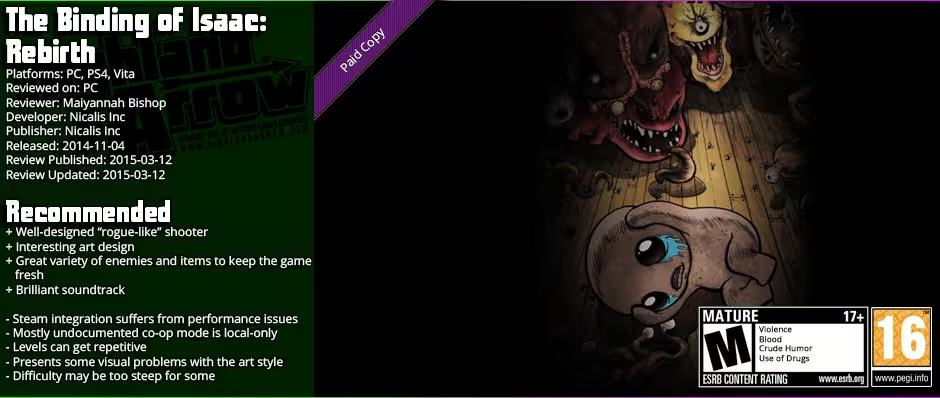

The Binding of Isaac: Rebirth is a twin-stick shooter with rogue-like elements designed by Edmund McMillen (of Super Meat Boy fame), and developed and published by Nicalis, Inc. Rogue-like sure is a term that gets bandied around a lot lately, and I've ranted previously on it, but Isaac probably deserves it more than others, with a tile (room) based setup, procedural generation of monsters and levels, and a focus on resource management. That said, it still doesn't fit the traditional definition of rogue-likes being a twin-stick and in real-time as opposed to turn-based, as well as having several set pieces and mild puzzles to be solved. There, now that I've gotten that out of my system, I can go on to say: irrespective of what Rebirth is or isn't in terms of genre, what it most definitely is, is fun. The game is a well-designed twin-stick shooter with a vivid art design, a lot of variety, some rocking tunes, and a very strong, easy-to-learn and hard-to-master set of mechanics. As a remake of the original Binding of Isaac, it is demonstrably better in almost every way: much greater performance, a dearth of new enemies and items, a new local co-op mode. But that's enough gushing, let's dig into this a little, aye?
Rebirth is rock hard at its core, in more ways than one
The game design at offer in Rebirth is, to be fair, very classic Rogue: there are a handful of consumables you must manage (keys, bombs, coins), procedurally-generated maps, perma-death, and the like, but it's fairly more structured than an actual rogue-like - for example, the game progresses along a set path of levels: two procedurally-generated "basement" levels, then two procedurally-generated "crypt" levels, and so on. As with most of these "rogue-likes" that are not really rogue-likes, they are mostly defined by how they deviate from that standard formula in that fashion, but I will say, Rebirth doesn't do so as vastly as many others, and it probably benefits from it.
While the game does vary from that traditional turn-based RPG format of Rogue, the twin-stick shooting that Rebirth has to offer is solid and has a good skill ceiling, involving fairly tactical shooting that relies heavily on positioning and your upgrades you have gotten through the game to provide more damage, different elemental effects, and the like. Controls follow the traditional keyboard twin-stick layout: WASD for moving the character and the cursor keys for the shooting. The mechanics of the shooting include a drift when you're strafing and a drop off at range, and as such there is definitely some skill in being able to both dodge and shoot at the same time.
Difficulty is one aspect where the game can have a hangup for some people, because it is indeed a fairly difficult game at first, especially until you unlock many of the items the game has to offer. That said, it's a very fair difficulty: even on the runs where the procedural generation is harsh on the player you are still entirely able to succeed if you are skilled enough to do so (and indeed a badge of pride in the community to complete the game without using the items you can pick up across the game). The meta progression is something that naturally happens as long as you keep playing, and there was never really a time where I felt it was losing steam, although towards the end of that progression it can feel a little like an exponential. Nonetheless, while I can foresee some having trouble with the difficulty, but I never really felt it was that unfair or harsh.
Variety of items and weapons on offer keeps the game fairly fresh
That variety of items, levels, and monsters is a pretty consistent strength for Rebirth. Throughout the release of the original and the time following thereafter the community thrived in the discussion and debate of the merits of the various combinations you can get throughout the game, which combinations were superior, which were inferior, and so on, and the one thing that Rebirth takes best from the rogue-like genre is the feeling that no two playthroughs are really the same, although the structure to the level progression does diminish that in a very small way, since the general level progression can be expected to follow the same (albeit branching at one point based on choice) path on any given run.
Item variety in particular has been a huge boon to Rebirth, both in terms of the game's variety and depth itself, which is obvious, but also in the development of the community at large as well. It's very much a great "water-cooler" game in that it's a game that makes a multitude of different stories. No two runs are entirely the same, and as such stories abound of getting different killer combos or of how one run completely wrecked you. That depth in different experiences with the game gives it a tremendous amount of replayability and staying power, capitalising and indeed only improving upon the strength of the original in that regard.
The art and sound design are brilliantly-executed
Aesthetics of the game are one of the things that stand out to most, and it's a game that has some very brilliant art direction. It meshes a 16-bit style with that sort of Tim Burton-inspired aesthetic masterfully, and the game seems to scale fairly well independent of resolution, without any real artifacting (beyond some blockiness at higher resolutions), and it seems to work well on one monitor or two, fullscreen or otherwise. The style manages to both hit the 16-bit look while also looking hand-painted at the same time, and does so pretty well. Sound design keeps the cues for different items, damage, and events highly unique while at the same time not saturating you with a bunch of meaningless background noise, so those cues are clear and effective. The very limited narration is delivered well as well. If I had any complaint about the game in that regard it's that it can be quite loud.
In fact, that would be my main criticism on the technical side of the game: the gamma leaves the game very dark by default, and raising it can make it look very washed out, and the sound and music by default are rather loud. The default values there, in other words, could use some tweaking, in other words, but that's not a complete fix, just mostly - there are hidden blocks in the game that do have very subtle colour cues, and are therefore hard to miss given what is essentially a lack of contrast. Thankfully, there are also hints to those blocks beyond just the colour, so it's not that bad.
Cooperative play is a welcome addition, but is left to local-only
One of the biggest additions to Rebirth over it's predecessor is a local co-op play using a second controller (or the keyboard and a controller) which allows two people at the same machine to play together, couch co-op as it's called. It's undocumented as far as I saw in the game, but not hard to come by: just press start on the second controller. It's a great addition and the difficulty seems to scale appropriately once the second player is in, and it's quite fun to play with a second person. It's a shame that it's local only, however, without any ability to network, since computers are not really conductive to local multiplayer unfortunately.
Rebirth's themes might be troublesome although I found them rather interesting
So I left off the kind of elephant in the room to the end because I don't give it the credence most do, and I'm not some zealot moral crusader, but one of the controversies that surrounded the original as well as Rebirth are it's themes. The Binding of Isaac, loosely inspired by a modern-setting retelling of the biblical story, touches upon a lot of ideas and themes, such as gender dysphoria, challenging of Religious themes, heavily-implied child abuse, and more. It tells the story of a young child named Isaac, whose mother "hears the voice of god", and so the child flees into a chest in his room, and presumably into the basement, fighting monsters and the like which constitutes the gameplay. I won't explain further, to save the spoilers.
A lot of discussion has been had about those themes and their deeper meaning, and I'm not here to offer literary critique. The story as presented in the game is meant as a framing device, pure and simple, so reading into it, in this case, seems rather disingenuous and unfair to the work. Nonetheless, whether it imposes those themes fairly is a worthy discussion, but hard to answer. The game presents tabula rasa in that case: it showcases those themes and presents them, but that's it. No judgement is made, and in fact, the central theme of the game in terms of that story is the question of the matter, more than being preoccupied with a specific answer or pushing a given message, and that is something I actually really appreciated.
Rebirth improves by leaps and bounds over
the original, but it still has a few technical problems
The original Binding of Isaac was almost infamous for the Flash that it was based upon bogging down even on very strong computers because of the limitations of the flash platform. Rebirth presents its own 2D engine and it is much stronger in that regard, and much prettier in that way as well, presenting new lighting effects, some particles, and more - just a general level of polish that was not previously possible without crimping it even more. All-in-all it's an improvement over the original Binding of Isaac, both visually and technically.
However, it's not entirely sunshine and rainbows, just mostly. In particular, the Steam overlay seems to occasionally bog down the game when receiving notifications, almost halving the frame-rate of the game. Of course, disabling the Steam overlay can resolve that issue, but it's a rather strange quirk indeed, especially since Rebirth marks the first time I've had such an issue with the Steam overlay. Annoyances prior to Rebirth? Of course. Actual technical problems like halving the frame-rate of a game, however? Rebirth is the first time I have come across that, and it's very odd. That said, as I mentioned, it's easy enough to resolve that issue.
The other technical problem I had with Isaac is the controls aren't rebindable. This is to be expected with controllers, but has come to be expected with mouse & keyboard. The existing controls are fine as they are for me personally, but having the ability to rebind them would certainly not be a bad thing - or at the very least list them, since the game does not at it's onset.
At the end of the day, the Binding of Isaac: Rebirth is one of my favourite games of the past year, and the few problems it does have hardly detracts from that fact. It's a solid game, well-presented, with some interesting themes, and a very solid core gameplay.


